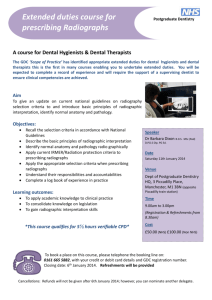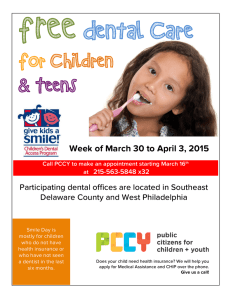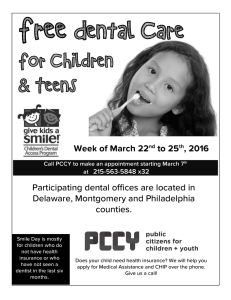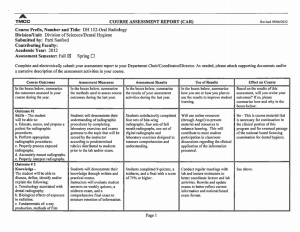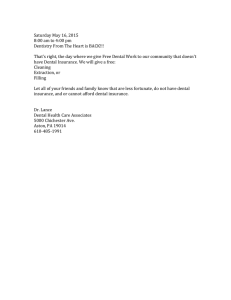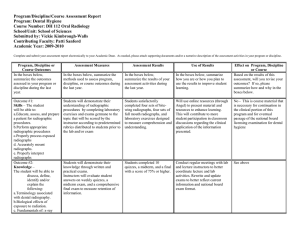2004.21 - DH 268 Advanced Dental Radiology Interpretation (addition)
advertisement
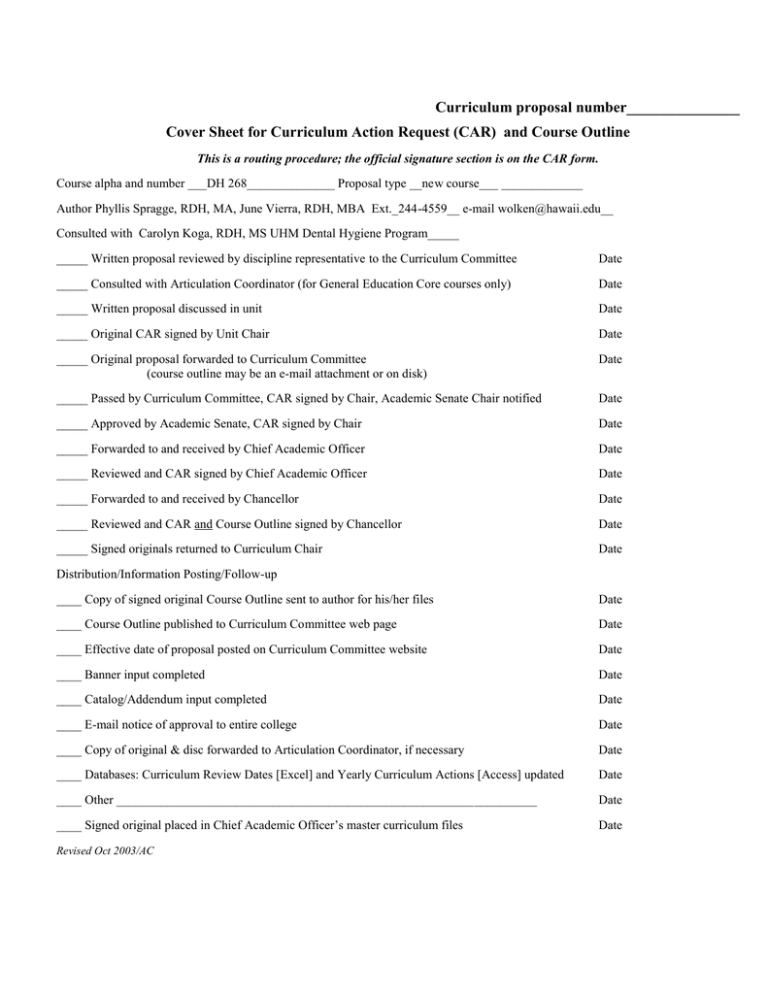
Curriculum proposal number_______________ Cover Sheet for Curriculum Action Request (CAR) and Course Outline This is a routing procedure; the official signature section is on the CAR form. Course alpha and number ___DH 268______________ Proposal type __new course___ _____________ Author Phyllis Spragge, RDH, MA, June Vierra, RDH, MBA Ext._244-4559__ e-mail wolken@hawaii.edu__ Consulted with Carolyn Koga, RDH, MS UHM Dental Hygiene Program_____ _____ Written proposal reviewed by discipline representative to the Curriculum Committee Date _____ Consulted with Articulation Coordinator (for General Education Core courses only) Date _____ Written proposal discussed in unit Date _____ Original CAR signed by Unit Chair Date _____ Original proposal forwarded to Curriculum Committee (course outline may be an e-mail attachment or on disk) Date _____ Passed by Curriculum Committee, CAR signed by Chair, Academic Senate Chair notified Date _____ Approved by Academic Senate, CAR signed by Chair Date _____ Forwarded to and received by Chief Academic Officer Date _____ Reviewed and CAR signed by Chief Academic Officer Date _____ Forwarded to and received by Chancellor Date _____ Reviewed and CAR and Course Outline signed by Chancellor Date _____ Signed originals returned to Curriculum Chair Date Distribution/Information Posting/Follow-up ____ Copy of signed original Course Outline sent to author for his/her files Date ____ Course Outline published to Curriculum Committee web page Date ____ Effective date of proposal posted on Curriculum Committee website Date ____ Banner input completed Date ____ Catalog/Addendum input completed Date ____ E-mail notice of approval to entire college Date ____ Copy of original & disc forwarded to Articulation Coordinator, if necessary Date ____ Databases: Curriculum Review Dates [Excel] and Yearly Curriculum Actions [Access] updated Date ____ Other ___________________________________________________________________ Date ____ Signed original placed in Chief Academic Officer’s master curriculum files Date Revised Oct 2003/AC Curriculum proposal number______________ Curriculum Action Request (CAR) (Form 4-93) - Maui Community College 1. Author(s)____Phyllis Spragge, RDH, MA, Joyce Yamada, RDH______________ 2. Authors’ unit(s) ___ Allied Health_______________________ 3. Date submitted to Curriculum Committee______October 22, 2004________________ 4. a. General type of action? b. Specific type of action Addition _x_regular __experimental __other (specify) ___________ __course __program Modification __number/alpha __title __credits _ description __prerequisites __corequisites __program __other (specify) ___________ 5. Reason for this curriculum action course for new dental hygiene program 6. Existing course alpha number title credits 7. Proposed new/modified course __DH 268_____Advanced Dental Radiology & Interpretation__________________1_____ alpha number title credits 8. New course description or page number in catalog of present course description, if unchanged. Expands clinical lab experience taking and interpreting x-rays on clients. Includes advanced radiographic identification and interpretation utilizing dental x-ray films, panoramic, cephalometric, and other extraoral radiographs. Analyzes future trends in radiographic imaging. 9. Prerequisite(s) DH 267 with at least a C 10. Corequisite(s) 11. Recommended preparation 12. Is this course cross-listed? ___yes __x_no If yes, list course 13. Student contact hours per week lecture_1__hours lab_2_hours lecture/lab__hours other___hours, explain 14. Revise current MCC General Catalog page(s)_________________________________ 15. Course grading _x__letter grade only ___credit/no credit 16. Proposed semester and year of first offering? 17. Maximum enrollment___12__ ___Fall__semester _x_yes __no ___audit ___07__year Rationale, if applicable 18. Special scheduling considerations? 12:1 Lect/Lab ___either If yes, explain. 19. Special fees required? _x_yes __no If yes, explain. Malpractice 20. Will this request require special resources (personnel, supplies, etc.?) _x_yes __no If yes, explain. Dental facility 21. Is this course restricted to particular room type? _x_yes __no If yes, explain. Dental laboratory with radiology equipment, light boxes 22. _x_Course fulfills requirement for ____dental hygiene__________ program/degree __Course is an elective for __________________________________ program/degree __Course is elective for AA degree 23. This course __increases __decreases _x_makes no change in number of credit required for the program(s) affected by this action 24. Is this course taught at another UH campus? __yes _x_no a. If yes, specify campus, course, alpha and number b. If no, explain why this course is offered at MCC 25. a. Course is articulated at __UHCC __UH Manoa __UH Hilo __UH WO __Other/PCC b. Course is appropriate for articulation at __UHCC __UH Manoa __UH Hilo __UH WO __Other/PCC c. Course is not appropriate for articulation at __UHCC _x_UH Manoa __UH Hilo __UH WO __Other/PCC d. Course articulation information is attached? __yes __no ....................................................................... Proposed by Approved by ___June Vierra________________ _________________________________ Author or Program Coordinator/Date Academic Senate Chair/Date Requested by ____ Nancy Johnson _____________ Division or Unit Chair/Date _________________________________ Chief Academic Officer/Date Recommended by _________________________________ Curriculum Chair/Date Revised July 2004/AC _________________________________ Chancellor/Date Maui Community College Course Outline 1. Alpha and Number Dental Hygiene 268 DH 268 Course Title Advanced Dental Radiology & Interpretation Number of Credits One credit (1) Date of Outline October 14, 2004 2. Course Description Expands clinical lab experience taking and interpreting x-rays on clients. Includes advanced radiographic identification and interpretation utilizing dental x-ray films, panoramic, cephalometric, and other extraoral radiographs. Analyzes future trends in radiographic imaging. 3. Contact Hours Per Week: Lec - One (1), Lab – Two (2) 4. Prerequisites DH 267 with at least a C Corequisites Recommended Preparation Approved By ______________________________ Date________________ 5. General Course Objectives Expands experience clinical with exposure, processing, mounting and interpretation of x-rays on clinic clients. Focuses on refinement of dental radiographic interpretation skills and an introduction to advanced interpretation of dental radiographs. 6. Student Learning Outcomes For assessment purposes, these are linked to #7, Recommended Course Content. Upon successful completion of this course the students will be able to: a. b. c. d. e. f. g. h. i. j. k. l. m. n. o. p. q. r. s. t. Define the terms of radiographic interpretation and diagnosis. Explain the role of the dentist and dental hygienist in interpretation and diagnosis. Summarize the importance of educating dental patients concerning dental radiographs. Identify basic film exposure and processing faults for periapical, bitewings and panoramic films. Discuss the importance of correlating radiographic interpretations with other examination findings. Define descriptive terminology and state what should be documented for all radiographic lesions. Define the terms unilocular, multilocular, focal opacity, target lesion, multifocal confluent, irregular/illdefined, ground glass mixed lucent-opaque, and soft tissue opacity. Identify on radiographs and define the terms: periapical, inter-radicular edentulous zone, pericoronal, and alveolar bone loss. Define the terms: millamperage, kilovoltage, density , contrast, and exposure time. Define the buccal object rule, state the uses of the buccal object rule, and take radiographs utilizing the buccal object rule. Explain digital radiography versus traditional dental radiography and state the pros and cons of each. Identify procedures and equipment used for digital radiography. Discuss and identify radiographic interpretation of the following pathologies: paranasal sinuses, salivary gland radiology, jaws lesions, systemic diseases manifested on radiographs, developmental disturbance of the face and jaws, and trauma to the teeth and facial structures. Describe and demonstrate cephalometric and panoramic techniques, and list the uses, advantages and limitations of both. Explain the future trends in dental radiography: TMJ films and magnetic resonance imaging. Perform radiographs on clinic clients using intraoral long-cone\radiographic techniques according to clinic guidelines completing 4 bitewing x-rays series with a maximum of 2 retakes, 3 full mouth x-ray series with a maximum of 4 retakes, and one panoramic x-ray with a maximum of 1 retake. Perform a comprehensive radiographic interpretation on each assigned clinic client and consult with an instructor to verify your findings. Describe and demonstrate the specialized techniques for clients of varying ages and disease states including: the use of small film, occlusal film, modified full mouth survey, and others. Given a client case study, apply the knowledge from this and other dental hygiene courses perform a comprehensive radiographic interpretation of the radiographs; identify radiolucent and radiopaque structures, evaluate for periodontal defects, endodontic lesions, pathology, and dental caries and restorations. Given sample questions on dental radiology from the Dental Hygiene National Board Examination, answer correctly at least 75%. 7. Recommended Course Content and Approximate Time Spent Linked to #6. Student Learning Outcomes. 1 week The principles & importance of radiographic interpretation (a, b, c, d, e) 1 week Descriptive terminology of interpretation (a, d, f, g, i) 1 week Buccal object rule (d, j) 1 week Digital radiography (k, l) 1 week Paranasal sinuses & Salivary gland radiology (a, b, e, f, g, h, m, r, s, t) 1 week Jaw lesions: cysts, benign tumors, malignant diseases of the jaw (a, b, e, f, g, h, m, r, s, t) 1 week Systemic diseases manifested on radiographs (a, b, e, f, g, h, m, r, s, t) 1 week Developmental disturbances of the face & jaws (a, b, e, f, g, h, m, r, s, t) 1 week Trauma to teeth and facial structures (a, b, e, f, g, h, m, r, s, t) 1 week Future trends in dental radiography: TMJ films, magnetic resonance imaging (b, c, e, m, n, o) 12 weeks Applied Dental Radiology & Interpretation: client case studies (a, b, c, d, e, f, g, h, i, j, k, l, m, n, o, p, q, r, s, t) 2 weeks National board radiology questions review (a, b, c, d, e, f, g, h, i, j, k, l, m, n, o, p, q, r, s, t) 8. Text And Materials, Reference Materials, Auxiliary Materials and Content Text materials will be selected from the best and most up-to-date materials available, such as Haring & Lind, Oral Radiology – Principles & Interpretation, current edition, Mosby, 2000, ISBN: 032302001 Frommer, Herbert, Radiology for Dental Auxiliaries, current edition Mosby ISBN 9. Recommended Course Requirements and Evaluation One or more midterm examinations, quizzes, and a final examination will be given. These tests may include any of the following types of questions: multiple choice, short answer, short essay, and critical thinking. Exams will cover material from lectures, laboratory exercises, and reading assignments. Satisfactory completion of Final Lab Practical with grade of C or better required. Attendance Quizzes Midterm 0-5% 10-15% 10-15% Final Client radiographs Radiographic interpretations Lab practical 15-20% 25-30% 20-25% 10-15% 10. Methods of Instruction Instructional methods vary with instructors. Techniques may include, but are not limited to, the following. Lecture Discussion Client case studies & interpretation exercises Group projects Supervised lab practice
